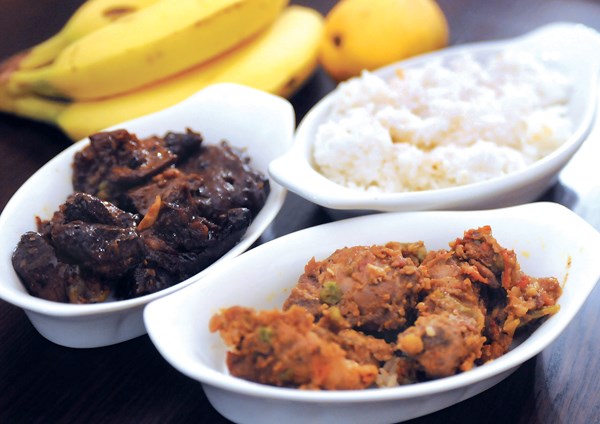What you don’t know can’t hurt you, or so the maxim goes.
When I was 17 years old, I saved up a bunch of money from various part-time jobs so that I could treat my date to a fancy Valentine’s Day dinner. I researched restaurants meticulously (quite a feat in those pre-Internet days) and settled on a posh French spot that served rabbit, frog’s legs and all manner of other fare that seemed sophisticated to my fledgling appetite.
My date and I met at her house and we cabbed it to the restaurant, Chez Something or Other. I wore a tie.
There is no doubt in my mind that the maitre d’ immediately clocked us for what we were: a couple of kids out for a one-time visit to an establishment that was well beyond our means. Nevertheless, he was exceptionally gracious throughout the evening, as was the entire staff, perhaps moved by the presence of such wide-eyed earnestness amidst the cynical commercialism of the occasion.
My date ordered Tournedos Rossini, an exceedingly expensive dish that made the hard-earned roll of 20s in my pocket seem dangerously insufficient. After much deliberation, I ordered Ris de Veau, deducing from my limited grasp of French culinary terminology that it must be some sort of chichi rice-and-veal preparation. What arrived was a delicious but frankly mysterious dish of light and supple meat-stuff in a rich sauce, with no rice in sight.
Following consultation with my dictionary the next day, I learned that I had ordered and eaten sweetbreads, Ris de Veau being the French term for calf’s thymus. I have been a fan of sweetbreads ever since but have often wondered if I would have ordered them that night had I been better informed.
I was reminded of this question when I recently visited Fiesta Filipino, a delightfully welcoming little spot on West Third Street in North Vancouver where classic dishes of the Philippines are made fresh daily, typically for take-out orders.
One of the dishes on offer there is Dinuguan, an intensely flavoured, nearly black pork stew that is a hallmark of Filipino cuisine. The dish is known euphemistically as “chocolate meat,” a term often applied to Dinuguan when speaking to uninitiated Westerners. The dish contains no chocolate, you see, but gets its distinctive colour and silky texture from its principal ingredient, pig’s blood.
Morsels of pork are cooked in the blood along with garlic and chili, and the whole dish is finished with vinegar, an important and characteristic ingredient used in many Filipino stews.
Dinuguan is tasty, make no mistake, and Fiesta Filipino does an expert rendition. It is hearty and rustic, with a complex flavour unlike any other stew. But it is an almost instinctive reaction for many in today’s eat-the-best-bits-only culture to recoil from the idea of blood in cuisine. Accordingly, many would never eat Dinuguan if the dish’s enduring “chocolate meat” alias wasn’t in place to distract them.
If this all sounds a bit too exotic to inspire a visit, please don’t fret. Fiesta Filipino cooks up some brilliant versions of more accessible national favourites, including Pancit Miki Bihon, an extraordinary stir fried noodle dish consisting of plump Shanghai-style egg noodles (miki), vermicelli-like rice noodles (bihon), thinly sliced strips of pork and chicken, celery, carrot, onion and cabbage all tossed in a garlicky sauce. It is a welcome riff on the ubiquitous take-out stir-fry and likely a dish you’ll seek again for it’s unusual blend of noodle textures.
Swayed by the bright colours of the dishes on offer at Fiesta, displayed in an enticing and modern steam table, as well as by the personable and patient staff, I sampled several more of the restaurant’s recipes, including Lumpiang Shanghai, deep fried spring rolls filled with ground pork and julienned vegetables. The cigar-shaped rolls were as light as air, super crispy and featured deep, satisfying flavours of garlic and soy sauce. I highly recommend picking up an order of these next time a friend asks you to bring an appetizer to a dinner party; they’ll be impressed.
Next up was a fillet of tilapia, lightly dusted in a subtle spice blend and deep fried, resulting in an elegant, still-moist fish that benefitted from a sparse application of patis, or fish sauce, the most common condiment of Filipino cuisine.
I then sampled a bright and fragrant goat stew, called Kaldereta, which was brimming with tender meat and crispy red peppers in a lush and garlicky tomato-based sauce.
Despite a voracious appetite and a will to make Filipino take-out my new focus, I barely scratched the surface of the restaurant’s menu. It is particularly heartening, then, that my massive order, which fed me for three solid meals, was just $56 before gratuity.
Fiesta Filipino is at 151 East Third St. in North Vancouver. 604-983-9111
Chris Dagenais served as a manager for several restaurants downtown and on the North Shore. A self-described wine fanatic, he earned his sommelier diploma in 2001. Contact: [email protected].



